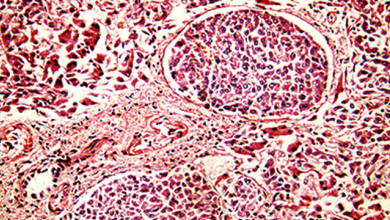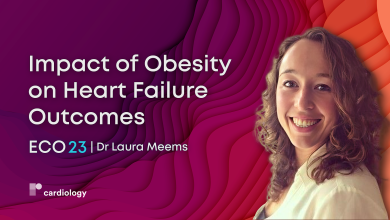Search results
Single-Ventricle Physiology
Author(s):
Lydia Taranto
,
Tabitha Moe
Added:
3 years ago
Article
Author(s):
Aleksandra Cieplucha
,
Werner Budts
,
Marc Gewillig
,
et al
Added:
1 year ago
Author(s):
David Morrow
Added:
3 years ago
Risk stratification of patients with an acute coronary syndrome (ACS) starts on presentation and is a continuous process to predict those who are at high risk for further ischemic events or adverse outcomes. Among patients with non-ST-elevation myocardial infarction (NSTEMI), risk stratification begins with initial assessment to detect patients at immediate high risk. Subsequent evaluation is…
View more
Author(s):
Jozine ter Maaten
Added:
7 months ago
ESC 2023 — Dr Jozine Ter Maaten (University Medical Centre Groningen, NL) joins us to outline the findings from the PUSH-AHF Study (NCT04606927).
PUSH-AHF (University Medical Center Groningen) aimed to assess the effect of natriuresis-guided therapy in patients with acute heart failure to improve diagnostic response, decongestion and clinical outcomes. 310 patients with a primary diagnosis of…
View more
Author(s):
Laura Meems
Added:
11 months ago
ECO 23 - We are joined by Dr Laura Meems (University Medical Center Groningen, NL) to discuss the impacts of obesity on the outcomes of heart failure.In this interview, Dr Meems outlines the effects of obesity on the progression and management of heart failure and the available treatment options for patients in 2023.Interview Questions:How does obesity impact the progression and management of…
View more
Author(s):
Carl J Lavie
,
Richard V Milani
Added:
3 years ago
The potential benefits of formal, phase II cardiac rehabilitation and exercise training (CRET) programs have recently been reviewed in great detail.1–3 However, despite the substantial proven benefits of this therapy, which are outlined in part in this review, recent data have emphasized that many patients are not referred to formal CRET,4 and a minority of patients (14% of patients with acute…
View more
Author(s):
Nieca Goldberg
Added:
3 years ago
Cardiovascular disease (CVD) is the leading cause of death and disability in American women. Since 1984, more women have died of cardiovascular disease than men. More than 200,000 of these deaths are due to coronary heart disease.1 In two-thirds of these women, sudden death was the presenting symptom and studies2 show that 90% of them had at least one of the modifiable risk factors (e.g…
View more
Author(s):
Zeljko J Bosnjak
,
David C Warltier
Added:
3 years ago
Cardiovascular disease is a major healthcare problem in the US. The presence of this disease significantly affects the outcome of both cardiac and non-cardiac surgery, and peri-operative cardiac morbidity is one of the leading causes of death following anesthesia and surgery. The considerable incidence of myocardial infarction, congestive heart failure, myocardial ischemia, or serious…
View more
Author(s):
Zeljko J Bosnjak
,
David C Warltier
Added:
3 years ago
Cardiovascular disease is a major healthcare problem in the US. The presence of this disease significantly affects the outcome of both cardiac and non-cardiac surgery, and peri-operative cardiac morbidity is one of the leading causes of death following anesthesia and surgery. The considerable incidence of myocardial infarction, congestive heart failure, myocardial ischemia, or serious…
View more
Author(s):
David SH Bell
Added:
3 years ago
Thiazolidinediones (TZD) and metformin lower cardiac risk factors, as do serum glucoses, and are therefore the best choice for initial therapy of type 2 diabetes. To choose between metformin and a thiazolidinedione is difficult because of the many benefits of both drugs. In most cases, a combination of metformin and a TZD is chosen, and this article describes the rationale for this decision.
The…
View more













